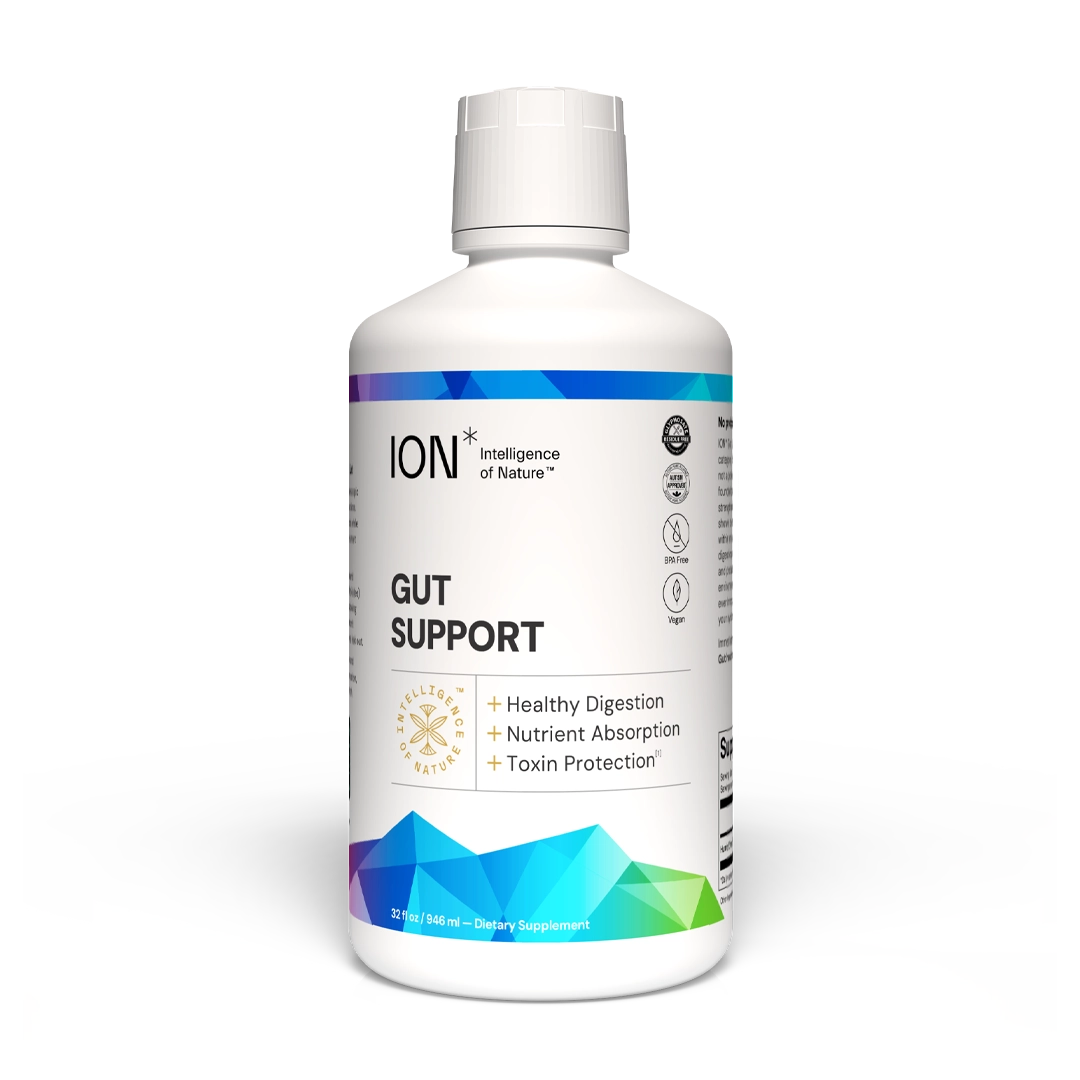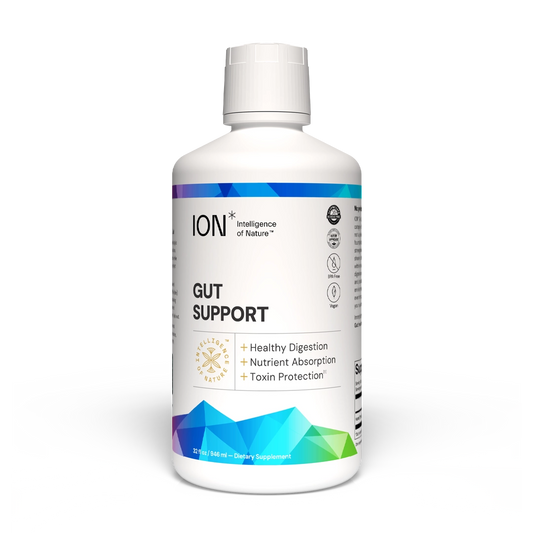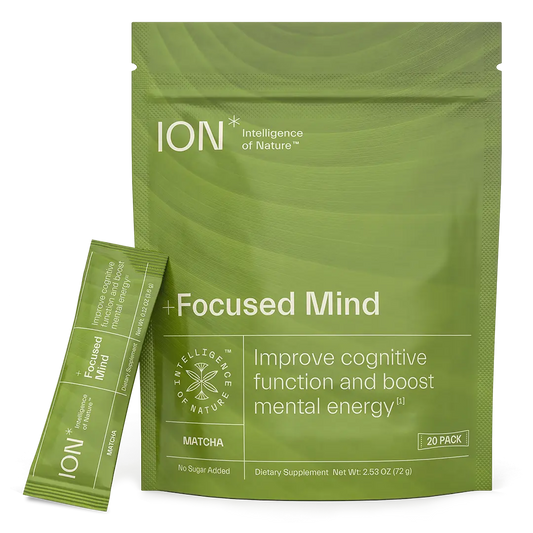Becoming recognized as the common denominator across overall wellbeing, gut health is an increasingly popular topic of conversation, and for many good reasons. Research continues to reveal how our gut microbiome plays a crucial role in various aspects of human health. So, it's high time we reassess what gut health means and how to improve it.
Gut health is characterized by the balance and function of the gut microbiome, a complex ecosystem of microorganisms living in our gastrointestinal tract that affects various systems beyond digestion. The gut microbiome controls gut health by communicating with the intestinal cells, digesting food, and preventing disease-causing bacteria from clinging to the intestinal walls. But that’s just the underlying function.
Despite being localized in the abdomen, the role of gut health extends well beyond the stomach and intestinal lining, or the body’s ability to break down food and absorb key nutrients. Gut health has a direct impact on systems related to immune system health, skin health, heart health, and mental health. Per the latter, the fascinating connection between gut and brain – otherwise known as the gut-brain axis – plays a key role in mood disorders like anxiety or depression.[1]
Why Is Gut Health So Important?
It's difficult to overstate the importance of gut health. A healthy gut consists of diverse microbial populations that work together to maintain an optimal environment for nutrient absorption and waste elimination. However, these important digestive processes are only the tip of the iceberg, as the gut has a wide-ranging influence over many vital systems and functions throughout the body.
Gut health is critically important for a number of reasons, including:
- Digestion and absorption of nutrients: Perhaps the most obvious function is the gut's role in breaking down the foods you eat and absorbing essential nutrients that support your body’s vitality.
- Immune system: Your gut is home to 70-80% of the cells that make up your immune system, [2] creating an essential interplay between your gut's microbiota and having strong immunity. A healthy gut microbiome helps prevent harmful bacteria from taking over and subsequently compromising your immune system.
- Mental health: The gut and brain are interconnected via the gut-brain axis. Research suggests that a healthy gut microbiome plays a pivotal role in cognition and how we think, specifically as it pertains to improving mood and reducing symptoms of anxiety and depression. [3]
- Hormonal health: Closely related to mental health, a healthy gut is directly connected to hormone health, specifically serotonin. By way of the gut-brain axis, this feel-good neurotransmitter sends signals from the brain to different cells in your body, and a whopping 95% of serotonin originates in the gut. [4]
- Chronic disease prevention: An unhealthy gut microbiome has been linked to numerous chronic diseases, including diabetes, rheumatoid arthritis, asthma, cardiovascular disease, and inflammatory bowel disorders like irritable bowel syndrome (IBS) and inflammatory bowel disease (IBD). [5]
- Skin health: Poor gut health is often associated with skin conditions like acne, eczema, and psoriasis. This is largely due to inflammation caused by an imbalanced microbiome overrun with bad bacteria. Or worse, autoimmune issues triggering skin breakouts and life-disrupting flare-ups.
- Weight management: A healthy balance of good gut bacteria is a powerful mechanism that dictates metabolism and weight management. An imbalance of gut bacteria has been linked to obesity, as it plays a fundamental role in regulating appetite, energy absorption, fat storage, chronic inflammation, and circadian rhythms. [6]
Gut health is a major contributor to your overall wellbeing. An unhealthy, imbalanced gut can manifest as digestive symptoms early on, but can also lead to chronic diseases, immune system problems, and mental health issues down the road. In turn, maintaining a healthy gut microbiome is absolutely crucial for your body's overall health and quality of life.
Signs of a Healthy Gut
Maintaining optimal gut health can check a lot of boxes when it comes to living well and free from any life-altering conditions. A healthy gut is generally characterized by a lack of issues related to the systems above. That is, your digestion isn't overly sensitive, you don't get sick often, your mood is generally upbeat, and your mind is consistently clear.
More specifically, some of the most telling signs of a vibrant, healthy gut include:
- Healthy reactions to food: Experiencing no excessive bloating, gas, or abdominal pain after eating suggests efficient nutrient processing. No major food sensitivities or intolerances can also be a sign that your gut microbiome is abundant and capable of digesting the food you eat.
- Regular bowel movements: Consistent and comfortable elimination without any symptoms of constipation or diarrhea indicates proper digestive function. Similarly, the consistency of your stool (both in terms of its physical form and day-to-day differences) can also shed light on a properly-functioning gut.
- Fewer cravings for junk food: Low cravings for unhealthy foods like sugary sweets, alcohol, and refined carbohydrates may suggest a microbiome with an abundance of healthy gut bacteria. Likewise, craving whole foods like fruits and vegetables can indicate that your microbiome is sound and healthy bacteria are the dominant force in your gut’s ecosystem. [7]
- Sustained energy levels: Balanced blood sugar levels maintained by a healthy gastrointestinal tract can lead to feeling consistently energized throughout the day without relying on caffeine or sugar to stay focused and wakeful.
- Mental clarity: If brain fog is a foreign concept to how your mind operates, then it's a good sign that your gut health is on the right track. Based on what we know about the gut-brain axis, clear thinking and focus typically indicate strong gut health.
- Positive mood and stable emotional health: As mentioned above, poor gut health can be linked to mental health conditions like depression. So, if your mood is generally positive and your emotional health is stable, it's a good indicator that your hormones are well-balanced thanks to your gut vitality.
Nutrition is an essential ingredient to good gut health. Consuming a diverse range of gut-friendly foods, particularly those high in fiber, can promote the growth of healthy bacteria in the gut. So, if you’re eating a diet diverse in plants, aminos, and other nutrient-dense foods - and low in gut-destroying toxins like glyphosate - then it’s likely your gut health is a wellspring that’s positively feeding components throughout your body.
Symptoms of an Unhealthy Gut
The signs of an unhealthy gut can manifest itself in a myriad of ways, often making it difficult to pinpoint the gut microbiome as the source of the symptom. Pinning symptoms like fatigue and mood fluctuation to an imbalanced gut isn't always the first thing that comes to mind.
But with more science underscoring the gut's systemic role in shaping whole-body health, the warning signs are becoming increasingly clear. Here are some common symptoms of an unhealthy gut:
- Stomach disturbances: These include frequent or persistent symptoms of stomach distress and gastrointestinal problems, such as bloating, gas, diarrhea, constipation, and heartburn.
- Food intolerances or sensitivities: Not to be confused with immuno-reactive food allergies, intolerances or sensitivities to foods can trigger gastrointestinal symptoms like diarrhea, abdominal cramping, bloating, and gas.
- Autoimmune problems: An overabundance of "bad" gut bacteria taking over the microbiome may trigger autoimmune issues. These symptoms can translate to skin problems, stomach distress, and other more severe allergic reactions.
- Weight fluctuations: Unintentionally gaining or losing weight without changing your diet, exercise habits, or supplement regime can be a sign of an unhealthy gut.
- Skin irritation: Skin conditions like eczema, hives, and frequent breakouts may be linked to an unhealthy gut. These problems can sometimes be a byproduct of autoimmune conditions.
- Fatigue: An unhealthy gut can lead to fatigue and low energy levels. Individuals with gut microbiome deficiencies often report chronic fatigue symptoms. [8]
- Mood changes: The gut-brain connection establishes an interplay between microbiome makeup and mood, suggesting that an unhealthy gut microbiome can lead to dramatic mood changes and mental health conditions, like anxiety and depression.
Intense cravings for certain unhealthy foods and beverages can also be a sign that your gut microbiome is off or hosts an overly high population of bad bacteria.
For instance, a consistent diet of refined sugar only builds upon those unhealthy microbes that are overtaking your stomach. Over time, these microbes accumulate and ultimately shape your cravings to want more and more of what’s there, diminishing the desire to consume healthy, good-bacteria foods that your gut truly needs.
How to Improve Gut Health
No doubt, dialing in your diet and nutrition is the benchmark requirement to improve gut health. But you may be surprised to learn that there are far more ways to help restore the healthy balance of your gut.
Consume Foods Rich in Fiber
Fiber stimulates the growth and diversity of good bacteria in the gut while promoting healthy digestion and processing of foods. Studies show that upwards of 95% of Americans are not getting enough fiber in their diets, which is a major contributor to countless diseases and health problems. [9]
Eat a Variety of Nutrient-Dense, Plant-Based Foods
Consuming a wide spectrum of plant-based foods can help improve gut health by introducing a diverse range of nutrients. Flooding your system with whole plant foods is key to rebalancing an imbalanced gut microbiome and restoring a compromised intestinal lining.
Limit Alcohol Intake
Excessive alcohol consumption can wreak havoc on the gut lining over time and disrupt the balance of gut bacteria. Minimize alcohol intake as much as possible, especially if you're trying to heal gut issues.
Stay Hydrated
Drinking enough water can help keep the digestive system functioning properly. Hydration has been shown to support the mucosal lining of the intestines and help foster the right balance of “good” bacteria in your microbiome. It's one of the easiest, most accessible, and immediate ways to improve the health of your gut.
Minimize Stress Levels
Chronic stress can disrupt the balance of gut bacteria and lead to inflammation in the gut and disrupt immune system function. Cultivate stress-reducing habits and routines, like meditation, regular exercise, socializing with friends and family, or getting outdoors into nature.
Exercise Regularly
In addition to buffering stress, exercise can improve gut health by reducing inflammation, regulating hormone balance, and promoting the growth of beneficial gut bacteria. Simply taking up a yoga practice or going for regular walks can help maintain harmony in the gut.
Incorporate Probiotic-Packed Foods
Fermented foods like yogurt, kefir, sauerkraut, and kimchi naturally contain beneficial bacteria that can improve gut health. The key is getting these probiotics from natural food sources, not capsules, and incorporating these probiotic-rich foods into your diet to help restore the symbiosis of good, gut-friendly bacteria.
Chew Your Food Thoroughly
It might seem elementary, but the default habit of mindless eating behaviors is very real. Taking your time to enjoy your food and chewing it thoroughly is crucial in aiding digestion and enabling the body to absorb nutrients more effectively.
Get Plenty of Sleep
Similar to stress reduction, getting quality, uninterrupted sleep can positively affect your health in a number of ways, especially by allowing the gut to rest and repair itself. Prioritize getting at least 7 to 8 hours of quality sleep per night. Your gut, and body as a whole, will thank you for it.
Improving gut health depends on not just the state of the microbiome, but also the strength of the gut lining. So while it’s important to actively promote the growth of beneficial bacteria in your microbiome, reinforcing the gut lining involves both dietary and lifestyle changes, like reducing stress and maximizing sleep.
Gut Health is Vital to Overall Health
There's a reason why the gut is often debated as being a vital organ in the body. It's one of the most complex and influential systems that plays a lead role in the health and quality of our heart, brain, immune system, mood, digestion, sleep, and more.
In turn, nurturing your gut's health is one of the best things you can do to support the overall health and vitality of your mind and body.
Frequently Asked Questions
Gut health is tremendously important for our overall health. But what does it mean, and how can you improve it? Here are some common questions and answers surrounding this critical topic.
What Does Gut Health Mean?
The meaning of gut health pertains to the equilibrium of microorganisms residing in your digestive tract, but its health implication involves far more than what's localized in the gut itself. Collectively, the balance of microorganisms in the gut or gut bacteria, work together to aid in digestion, bolster immune system functioning, promote mental wellbeing, facilitate weight management, and prevent heart disease.
How can I improve my gut health?
Enhancing the health and overall functioning of your gut requires a multifaceted approach. For starters, it's important to consume a well-rounded, nutritionally-dense diet that's rich in fiber and natural probiotics. It's also beneficial to engage in regular physical activity, manage stress effectively, get adequate sleep, and refrain from consuming major gut disruptors, like excessive consumption of alcohol or antibiotics.
What are the signs of poor gut health?
Some of the most common indicators of poor gut health include:
- Excessive bloating, gas, and stomach cramps after meals.
- Frequent diarrhea and/or constipation.
- IBD or IBS symptoms, such as abdominal pain, cramping, and bloating.
- Mental disorientation, chronic fatigue, and emotional fluctuations
- Unidentifiable weight changes, such as sudden weight loss or weight gain.
- Skin issues, like eczema, hives, rashes, or sudden breakouts
- Autoimmune ailments or persistent inflammation in the body
- Food sensitivity or intolerance symptoms
How do I check my gut health?
To evaluate the health of your gut, consult with a healthcare provider or use an at-home microbiome testing kit to gain information about the makeup of bacteria in your digestive system. You can also check for food intolerances or allergies with the right testing procedures, which can help rule out certain conditions that may be flaring up gut problems.
What are the signs of a healthy gut?
A healthy gut is marked by a whole host of benefits:
- Consistent bowel movements
- Efficient digestion and absorption of nutrients
- Blemish-free skin
- Balanced mood
- Abundant energy levels
- Robust immune function
- Decreased inflammation throughout the body
- Lack of symptoms for chronic diseases
Of course, certain health conditions or lifestyle factors can influence these markers. But in many cases, the gut is often a root contributor to minimizing problems associated with these signs.
Optimize Your Gut Health Today
Overall, taking care of gut health is essential for maintaining a healthy mind and body. As we age, our gut is your guard to preventing chronic diseases like diabetes, cardiovascular disease, and mental health disorders.
Scientific References
1, 4. https://www.ncbi.nlm.nih.gov/pmc/articles/PMC5641835/
2. https://pubmed.ncbi.nlm.nih.gov/33803407/
3. https://www.ncbi.nlm.nih.gov/pmc/articles/PMC7510518/
5. https://www.nature.com/articles/s41430-021-00991-6
6. https://www.ncbi.nlm.nih.gov/pmc/articles/PMC8291023/
7. https://www.pnas.org/doi/10.1073/pnas.2117537119
8. https://www.cell.com/cell-host-microbe/fulltext/S1931-3128(23)00029-X
9. https://www.ncbi.nlm.nih.gov/pmc/articles/PMC6124841/













